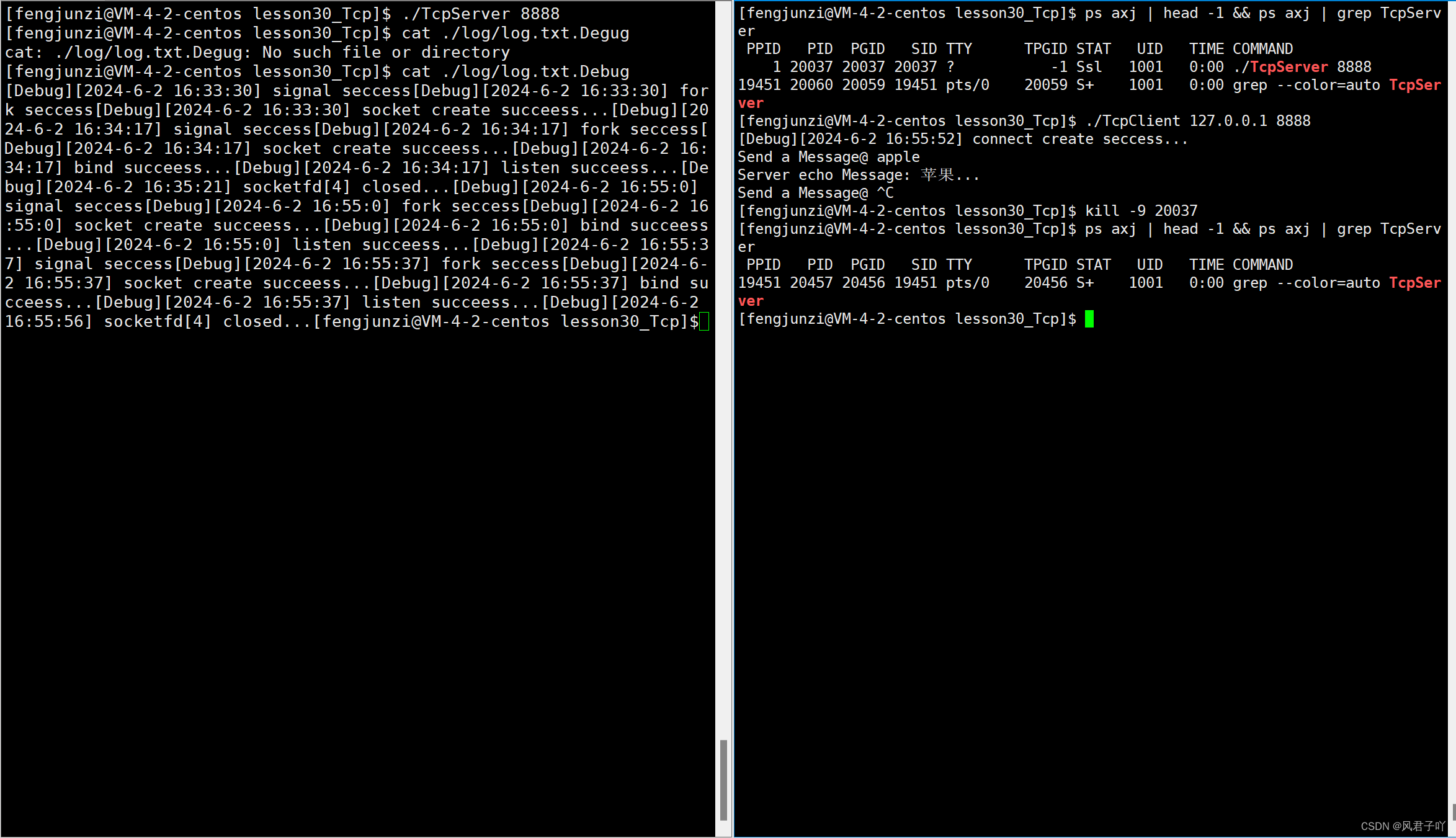文章目录
- 前言
- [一、pid_t setsid(void);](#一、pid_t setsid(void);)
- 二、守护进程
- 翻译字典服务器(守护线程版)
前言
根据上章所讲的后台进程组和session会话,我们知道如果可以将一个进程放入一个独立的session,可以一定程度上守护该进程。
一、pid_t setsid(void);
该系统接口函数可以将一个不是进程组组长的进程放入一个独立的session会话的后台进程中。
二、守护进程
cpp
#include <signal.h>
#include <unistd.h>
#include <iostream>
#include <string>
#include <sys/types.h>
#include <sys/stat.h>
#include <fcntl.h>
const std::string filepath = "/dev/null";
void Daemon(const std::string &cwd = "")
{
// 1.忽略非致命终止信号
signal(SIGCHLD, SIG_IGN);
signal(SIGPIPE, SIG_IGN);
signal(SIGSTOP, SIG_IGN);
// 2.fork并进入独立session
if (fork() > 0)
exit(0);
setsid();
// 3.改变工作目录
if (!cwd.empty())
chdir(cwd.c_str());
// 4.标准输入输出错误文件描述符重定向
int fd = open(filepath.c_str(), O_RDWR);
if (fd != -1)
{
dup2(fd, 0);
dup2(fd, 1);
dup2(fd, 2);
close(fd);
}
}- 忽略掉忽略非致命终止信号,使进程不那么容易被信号终止。
- 因为setsid接口函数我们说过,它不能把一个是进程组组长的进程放入一个独立的session会话当中,既然不能是进程组组长,那我们就创建一个子进程来运行后续代码,父进程直接退出。
- 在有一定需求的情况下,可以更改自己的工作目录。
- 因为放入到独立的session会话中,向标准输入输出错误读写操作就没有意义了,所以我们可以重定向标准输入输出错误文件描述符。 而Linux系统给我们提供了这么一个文件在/dev/null,它是Linux系统专门提供给用户存放垃圾数据的文件,我们不管向里面怎么写数据,该文件大小保持不变;不管怎么读都是空。
翻译字典服务器(守护线程版)
cpp
#include <iostream>
#include <sys/socket.h>
#include <sys/types.h>
#include <string>
#include <arpa/inet.h>
#include <stdlib.h>
#include <unistd.h>
#include "log.hpp"
#include <netinet/in.h>
#include <string.h>
#include <pthread.h>
#include "threadPool.hpp"
#include "Task.hpp"
#include <signal.h>
#include "daemon.hpp"
const std::string default_ip = "0.0.0.0";
const uint16_t default_port = 8888;
const int backlog = 10;
std::string messageHandle(const std::string &ip, uint16_t port, const std::string &message)
{
time_t now = time(nullptr);
struct tm *lt = localtime(&now);
std::cout << lt->tm_hour << ":" << lt->tm_min << "[" << ip << ":" << port << "]: "
<< message << std::endl;
return message;
}
class TcpServer;
class TcpServer
{
public:
TcpServer(const uint16_t& port = default_port, const std::string& ip = default_ip)
: _listensock(-1)
, _server_ip(ip)
, _server_port(port)
{
}
void Init()
{
Daemon();
// 申请套接字
int sock = socket(AF_INET, SOCK_STREAM, 0);
if (sock == -1)
{
lg(Fatal, "socket create failed...");
exit(1);
}
lg(Debug, "socket create succeess...");
_listensock = sock;
// bind套接字
struct sockaddr_in local;
memset(&local, 0, sizeof local);
local.sin_family = AF_INET;
inet_aton(_server_ip.c_str(), &local.sin_addr);
local.sin_port = htons(_server_port);
if (bind(_listensock, (const sockaddr *)&local, (socklen_t)sizeof(local)) == -1)
{
lg(Fatal, "bind failed..., error:%s", strerror(errno));
exit(2);
}
lg(Debug, "bind succeess...");
// listen begin
if (listen(_listensock, backlog) < 0)
{
lg(Fatal, "listen failed...");
exit(3);
}
lg(Debug, "listen succeess...");
}
void run()
{
signal(SIGPIPE, SIG_IGN); // 防止因为读端关闭导致整个进程直接退出
struct sockaddr_in client;
socklen_t len;
ThreadPool<Task>::GetInstance()->Start();
while (true)
{
memset(&client, 0, sizeof client);
int socketfd = accept(_listensock, (struct sockaddr *)&client, &len);
if (socketfd < 0)
{
lg(Warning, "accept failed...");
continue;
}
lg(Info, "accept success..., and get a link, socketfd: %d", socketfd);
ThreadPool<Task> *threadpool = ThreadPool<Task>::GetInstance();
threadpool->Push(Task(socketfd, client));
}
}
private:
int _listensock;
std::string _server_ip;
uint16_t _server_port;
};效果图
